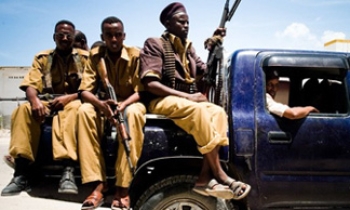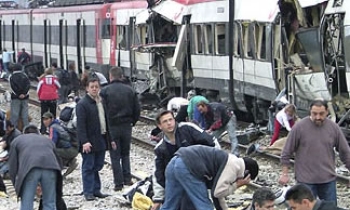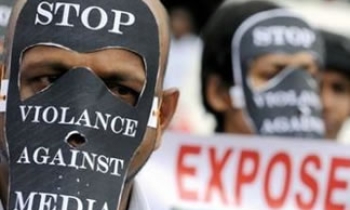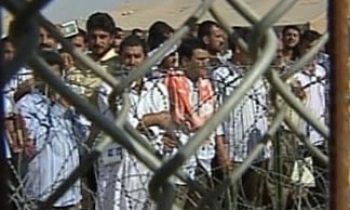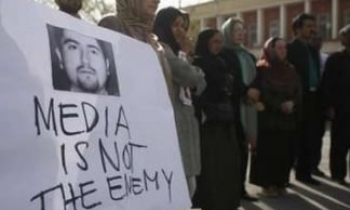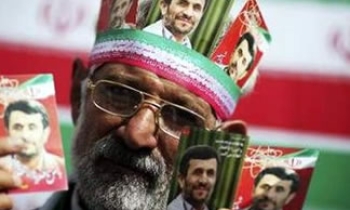Omar Fekeiki, a 28-year-old Iraqi citizen studying journalism at UC Berkeley, was at his campus apartment when he received news that chilled his heart: His friend and Washington Post colleague Salih Saif Aldin had been murdered while on assignment in a Baghdad neighborhood. Just two weeks before, Aldin, 32, had called Fekeiki to thank him for being a good mentor.
"He died for us to get the story," Fekeiki said of Aldin, who was shot in the forehead and left on a Baghdad street on Oct. 14. "I can't insult his death by not returning to Iraq."
For Fekeiki, one of the paradoxes of the war in Iraq is that the more Baghdad is engulfed in violence and the more journalists are endangered, the more he desires to return home.
Since March 2003, when the war began, the majority of the violence directed at reporters in Iraq has been reserved for Iraqi nationals like Aldin and Fekeiki, who often are viewed as Western conspirators using their skills to assist U.S. soldiers and security contractors.
One hundred fourteen journalists and media workers have been killed in Iraq since the start of the war in March 2003, as have 41 media support workers. Of the total 155 killed, 85 percent were Iraqi nationals, according to the Committee to Protect Journalists, a nonprofit organization based in New York.
Joel Campagna, the Middle East program coordinator for the committee, describes Iraq as "the most dangerous assignment in the world for journalists."
Fekeiki was at a cafe in Berkeley when he recalled his friendship with Aldin, his eyes welling with tears as he drew a heavy breath to compose himself. Fekeiki spoke well-groomed English, a language he learned while studying at a private university in Baghdad before the war.
He said he was threatened three times, the last of which sent him out of the country.
"My motivation to return is the story of my country," Fekeiki said. "My country is losing a chance to speak about what it suffers. ... We're losing our storytellers."
Omar Fekeiki never wanted to be a journalist. He grew up under Saddam Hussein's regime, the son of political subversives. A journalist, Fekeiki recalled, was a person who "just wrote what the government said. It was a taboo profession, not a respected one."
Fekeiki's father was a well-known opposition politician before Hussein took power in 1979. (Fekeiki declined to give his parents' names - they still live in Baghdad.) His father wrote under pen names for foreign publications, reporting on life under the regime, and for a time published a newspaper, Arrasid (The Observer).
At night, his parents hosted dinner-table conversations with fellow intellectuals over bottles of whiskey that had been smuggled in through Kuwait.
At a young age, he was told by his mother, "Don't repeat what's said in this house or we'll all get killed," he recalled.
"Imagine that pressure," Fekeiki said with some wonder. "You can't share anything with friends or you'll be responsible for the death of your family."
After the Persian Gulf War, Hussein's grip tightened, and the Fekeiki home was searched regularly. When friends tipped his parents about the next mattress-turning, it was Fekeiki's job to grab the stacks of foreign newspapers, run out to a nearby field and burn them.
In the chaotic days after Baghdad fell in April 2003, Fekeiki and some friends rushed to the Palestine and Sheraton Ishtar hotels, where rumor had it Western journalists were loaning their satellite phones to make calls to the outside world.
Fekeiki, who never before had spoken English to a native speaker, found himself in high demand. By chance, he was interpreting for a Washington Post reporter, who later introduced him to his bureau chief and asked if Fekeiki could help their reporters.
At the time, the request was an honor appreciated by most Baghdad citizens, Fekeiki said. He had unique access to the Western world and could communicate with the people now running the country.
The job was so prestigious, Fekeiki offered to work at the Post for free, as long as the reporters kept calling on him. (The Post declined his offer and paid him, yet another reason the job was held in high regard: He made a paycheck in a time of economic uncertainty.) Within a month of the invasion, Fekeiki was working as a "fixer," arranging interviews and assessing dangerous neighborhoods for the reporters. By October, he was the bureau's office manager, recruiting and training other Iraqis to assist the Western writers.
That's when he met Salih Saif Aldin.
Aldin spoke English, but like many other fixers, he didn't fully understand the demands of Western journalism. Fekeiki had to drill into his recruits the fact that reporters couldn't rely on rumors. They needed facts and attributed sources and direct quotes.
"Omar yelled a lot," recalled Bassam Sebti, 27, a former Iraqi fixer who now lives in Philadelphia and studies creative writing at Saint Joseph's University. "Omar took it very seriously - he loved the Post. He has journalism in his blood and loves everything about it. He did not want us to make any mistakes."
Yet Sebti recalled how by early 2004, after Western journalists had been abducted - if only for the headlines they could ensure (Sebti worked with American journalist Jill Carroll just before her capture) - the Iraqi fixers offered to enter the most dangerous neighborhoods on their own.
"We could blend in," Sebti said. "The worst that could happen is that we'd hide the notebook in our back pocket if we had to."
But as the war dragged on, and neighborhoods became highly defended zones demarcated by ethnic groups, even a notebook caused suspicion. After a string of Iraqi interpreters were found dead in the summer of 2004, it was so dangerous Sebti began sleeping next to an AK-47.
Sebti, unlike Fekeiki, is not convinced his return is necessary.
"I hate to say it," Sebti said, "but the world doesn't care anymore. If I were to return and got killed, the sacrifice might be in vain, for nothing."
The question of returning is one that also haunts Ayub Nouri, 28, a former fixer who studies journalism at Columbia University. In the early days of the war, Nouri produced his own radio reports from Baghdad. Then he fled, fearing for his life. "I wish I could go home tomorrow," Nouri said from New York. "I'd go straight to Baghdad to find out what's going on. ... But if I want to stay alive, it's a good option to stay here for now."
Nouri said that six months after the war began, simply speaking English aloud was enough cause to get killed. Many times he'd receive a call from a Western producer and would hang up immediately if another Iraqi was in earshot.
"If I speak English, people would wonder, who am I speaking English to - American soldiers, security companies?"
By 2005, Fekeiki had become a full-fledged correspondent for the Post, a reporter his bureau chief, Rajiv Chandrasekaran, had come to rely on.
"Omar could go to a car bombing, get the details and report on something that was maybe too dangerous for a lighter-skinned, Western journalist," Chandrasekaran said. "Omar took incredible personal risks, like many Iraqis, because what was happening mattered deeply to them."
Yet the distrust of Iraqis who worked for Americans as specialists and interpreters eventually came from all sides. When Fekeiki was embedded with the U.S. Marines in Fallujah, he said, the Marines were skeptical of this strange communicator - an Iraqi who spoke perfect English and was also a reporter.
Fekeiki also noticed that the Marines didn't trust their own Iraqi-born interpreters whom they had hired for interrogations; the military took away their cell phones on the suspicion that they were acting as moles, phoning in information from the base.
One morning, before heading out on a mission, a lieutenant colonel told Fekeiki to ride with the Iraqi interpreters who were seated in the back of an open-air humvee. The front of the humvee, shielded in armor, was reserved for U.S. soldiers and embedded American journalists.
Fekeiki demanded to sit in the front.
"They said, 'Don't you want to sit with your countrymen?' " Fekeiki recalled.
The reality was, Fekeiki also didn't trust the translators.
"Some of them were moles for the insurgents."
At Berkeley, Fekeiki described his work in the journalism school as boring, then wondered if he'd used the correct adjective. He meant he was working on good stories, but they weren't getting published. And given his background as a war correspondent, some of the assignments lacked excitement.
"It's a lot of fun, but that's all it is," Fekeiki said. He became passionate and focused again: "But it's not real life. Given the life I've lived so far, this is not real. You're supposed to suffer in life, this is what I know."
Fekeiki went to UC Berkeley after he met the former dean of the journalism school, Orville Schell, at a Duke University seminar on reporting in Iraq. Schell invited him to apply, and his Post colleagues encouraged him.
Before Fekeiki left Baghdad for Berkeley in August 2006, he was twice tailed and threatened as he was on his way from the Post office to his home. Later, a letter was taped to the door of his family home that basically read, "Quit or die."
Fekeiki said he didn't tell his Post bosses about the last incident - they'd been trying to relocate him for months - but now he figured it was time to leave, wait for things calm down.
"I expected all this to settle down within six months," he said. Then he'd return to his country with a master's degree in journalism, ready to open his own newspaper.
Fekeiki had snatched the letter from his door, walked into the middle of the street and ripped it to shreds.
"It was stupid," he said of the act, "but I sent a message back."
E-mail Justin Berton at jberton@sfchronicle.com.

